- Home
- Diana Wynne Jones
Year of the Griffin Page 2
Year of the Griffin Read online
Page 2
The dwarf stared at him. Or rather, he stared at Corkoran’s tie, frowning a little. Corkoran never minded this. He preferred it to meeting students’ eyes. His ties were designed to deflect the melting glances of girl students and to enable him to watch all students without their watching him. But the dwarf went on staring and frowning until Corkoran was almost uncomfortable. In the manner of dwarfs, he had his reddish hair and beard in numbers of skinny pigtails, each one with clacking bones and tufts of red cloth plaited into it. The braids of his beard were noticeably thin and short, and the face that frowned from under the steel war helm was pink and rounded and young.
“Ruskin,” the dwarf said at last in his peculiar blaring voice. The voice must be caused by resonance in the dwarf’s huge, square chest, Corkoran decided. “Dwarf, artisan tribe, from Central Peaks fastness, come by the virtual manumission of apostolic strength to train on behalf of the lower orders.”
“How do you mean?” Corkoran asked.
The dwarf’s bushy red eyebrows went up. “How do I mean? Obvious, isn’t it?”
“Not to me,” Corkoran said frankly. “I understood dwarf and Central Peaks, and that was all. Start again, and say it in words that people who are not dwarfs can understand.”
The dwarf sighed, boomingly. “I thought wizards were supposed to divine things,” he grumbled. “All right. I’m from one of the lowest tribes in our fastness, see. Artisans. Got that? Third lowest. Drudges and whetters are lower. Six tribes above us, miners, artists, designers, jewelers, and so on. Forgemasters at the top. All ordering us about and lording it over us and making out we can’t acquire the skills that give us the privileges they have. And around this time last year we got proof that this was nonsense. That was when Storn and Becula, both artisans and one a girl, forged a magic ring better than anything the forgemasters ever did. But the ring was turned down for treasure because they were only artisans. See? So we got angry, us artisans, and brought in drudges and whetters, and it turned out they’d made good things, too, but hadn’t even submitted them as treasure because they knew they’d be turned down. Oppression, that’s what it was, black oppression—”
“All right. Don’t get carried away,” Corkoran said. “Just explain how you come into it.”
“Chosen, wasn’t I?” Ruskin said. A slight, proud smile flitted above his plaited beard. “It had to be someone young enough not to be noticed missing and good enough to benefit here. They picked me. Then each one of them, young and old, man and woman, from all three tribes, put down a piece of gold for the fees and a piece of their magic into me. That’s the apostolic part. Then I came away secretly. That’s what we call virtual manumission. And I’m to learn to be a proper wizard, so that when I am, I go back and smash those forgemasters and all the rest of them. Overthrow the injustice of the old corrupt order, see?”
And now a dwarf revolutionary! Corkoran thought. Bother! He saw that if Myrna sent out her letter to Central Peaks fastness, it would almost certainly bring an enraged party of forgemasters (and so forth) here to remove Ruskin and his fees with him. He made another note by Ruskin’s name, while he asked, “Is that why you’re in full armor?”
“No,” Ruskin answered. “I have to come before my tutor properly dressed, don’t I?” He eyed Corkoran’s tie and T-shirt again and frowned.
“I advise you to leave it off in future,” Corkoran told him. “Iron interferes with magic, and you won’t know enough to counteract it until your second year. You’re going to have trouble, anyway, if you’re working with bits and pieces of other people’s magic.”
“Don’t think so,” Ruskin blared. “We dwarfs are used to that. Do it all the time. And we work with iron.”
Corkoran gave him up and turned, finally, to the griffin. “You.”
All this while the griffin had sat brightly swiveling an eye on each student who spoke and quivering with eagerness for her turn. Now she fairly burst forth, both wings rising and tufted tail lashing so that Felim and Olga had to move out of their way. “I’m Elda,” she said happily. “Wizard Derk’s daughter. I used to be his youngest child, but now I’ve got two younger than me: Angelo and Florence. Flo’s wings are pink. She’s the baby. She’s beautiful. Angelo’s wings are brown, a bit like Callette’s without the stripes, and he’s a magic user already. Mum says—”
“Hang on,” said Corkoran. “Wizard Derk is human. You’re a griffin. How come—”
“Everyone asks about that,” Elda said sunnily. “Dad made us, you know. He put some of himself and Mum and eagle and lion—and cat for me—into an egg, and we hatched. At least, we had an egg each. There’s me and Lydda and Don and Callette and Kit, who are all griffins. Shona and Blade are my human brother and sister, like Angelo and Flo, except that Shona and Blade don’t have wings. Shona’s married. She’s gone to run that new Bardic College out on the east coast. She’s got three girls and two boys, and I’m an aunt. And all the others except Mum and Dad and the babies have gone over to the West Continent in two ships, because there’s a war there—only Lydda’s flying, because she’s a long-distance flier and she can do a hundred and fifty miles without coming down to rest, but Dad made her promise to keep in sight of the ships just in case, because Kit and Blade are the ones who can do magic. Callette—”
“But what about yourself?” Corkoran asked, managing to break in on this spate of family history.
“What about me?” Elda said, tipping her bright bird head to look at him out of one large orange eye. “You mean, why did Mum send me here to keep me out of mischief?”
“More or less,” Corkoran said, wincing at that piercing eye. “I take it you have magic.”
“Oh, yes,” Elda agreed blithely. “I’m ever so magical. It keeps coming on in spurts. First of all I could only undo stasis spells, but after we saw the gods, I could do more and more. Mum and Dad have been teaching me, but they were so busy looking after the babies and the world that Mum says I got rather out of hand. When the others all went off on the ships, I got so cross and jealous that I went into the Waste and pushed a mountain out of shape. Then Mum said, ‘That’s enough, Elda. You’re going to the University whatever your father says.’ Dad still doesn’t know I’m here. Mum’s going to break it to him today. I expect there’ll be rather a row. Dad doesn’t approve of the University, you know.” Elda turned her head to fix her other eye on Corkoran, firmly, as if he might try to send her home.
The thought of doing anything to a griffin who could push a mountain out of shape turned Corkoran cold and clammy. This bird—lion—female—thing made him feel weak. He pulled his tie straight and coughed. “Thank you, Elda,” he said when his voice had come back. “I’m sure we can turn you into an excellent wizard.” And bother again! He made yet another note on his list for Myrna. If Derk was angry about Elda’s being here, he had certainly better not receive a demand for money. Derk had the gods behind him. Oh, dear. That made five out of six. “Right,” he said. “Now we have to sort out your timetable of classes and lectures and give you all a title for the essay you’re going to write for me this coming week.”
He managed to do this. Then he fled, thankfully, back to his moonlab.
“He didn’t say anything about the moon,” Ruskin grumbled as the six new students came out into the courtyard, into golden early-autumn sunlight, which gave the old, turreted buildings a most pleasing mellow look.
“But he surely will,” said Felim, and added thoughtfully, “I do not think assassins could reach me on the moon.”
“Don’t be too sure of that,” said Lukin, who knew what kings and emirs could do when they set their minds on a thing. “Why is the Emir—?”
Olga, who knew what it felt like to have secrets, interrupted majestically. “What have we got next? Wasn’t there a lecture or something?”
“I’ll see,” said Elda. She hooked a talon into the bag around her neck and whisked out a timetable, then reared on her hindquarters to consult it. It already had claw holes in all four corners. “A cl
ass,” she said. “Foundation Spellcasting with Wizard Wermacht in the North Lab.”
“Where’s that?” Claudia inquired shyly.
“And have we time for coffee first?” Olga asked.
“No, it’s now,” said Elda. “Over there, on the other side of this courtyard.” She stowed the timetable carefully back in her bag. It was a bag she had made herself and covered with golden feathers from her last molt. You could hardly see she was wearing it. The five others gave it admiring looks as they trooped across the courtyard, past the statue of Wizard Policant, founder of the University, and most of them decided they must get a bag like that, too. Olga had been using the pockets of her fur cloak to keep papers in—everyone handed out papers to new students all the time—and Ruskin had stuffed everything down the front of his chain mail. Claudia and Felim had left all the papers behind in their rooms, not realizing they might need any of them, and Lukin had simply lost all his.
“I can see I’ll have to be a bit better organized,” he said ruefully. “I got used to servants.”
They trooped into the stony and resounding vault of the North Lab to find most of the other first-year students already there, sparsely scattered about the rows of desks, with notebooks busily spread in front of them.
“Oh, dear,” said Lukin. “Do we need notebooks as well?”
“Of course,” said Olga. “What made you think we wouldn’t?”
“My teacher made me learn everything by heart,” Lukin explained.
“No wonder you have accidents then,” Ruskin boomed. “What a way to learn!”
“It’s the old way,” Elda said. “When my brothers Kit and Blade were learning magic, Deucalion wouldn’t let them write anything down. They had to recite what they’d been told in the last lesson absolutely right before he’d teach them anything new. Mind you, they used to come back seething, especially Kit.”
“It is not so the old way!” Ruskin blared. “Dwarfs make notes and plans, and careful drawings, before they work any magic at all.”
While he was speaking, the lab resounded to heavy, regular footsteps, as if a giant were walking through it, and Wizard Wermacht came striding in with his impeccably ironed robes swirling around him. Wermacht was a tall wizard, though not a giant, who kept his hair and the little pointed beard at the end of his long, fresh face beautifully trimmed. He walked heavily because that was impressive. He halted impressively behind the lectern, brought out an hourglass, and impressively turned it sand side upward. Then he waited impressively for silence.
Unfortunately Ruskin was used to heavy, rhythmic noises. He had lived among people beating anvils all his life. He failed to notice Wermacht and went on talking. “The dwarfs’ way is the old way. It goes back to before the dawn of history.”
“Shut up, you,” ordered Wermacht.
Ruskin’s round blue eyes flicked to Wermacht. He was used to overbearing people, too. “We’d been writing notes for centuries before we wrote down any history,” he told Elda.
“I said shut up!” Wermacht snapped. He hit the lectern with a crack that made everyone jump and followed that up with a sizzle of magefire. “Didn’t you hear me, you horrible little creature?”
Ruskin flinched along with everyone else at the noise and the flash, but at the words horrible little creature his face went a brighter pink and his large chest swelled. He bowed with sarcastic politeness. “Yes, but I hadn’t quite finished what I was saying,” he growled. His voice was now so deep that the windows buzzed.
“We’re not here to listen to you,” Wermacht retorted. “You’re only a student—you and the creature that’s encouraging you—unless, of course, both of you strayed in here by mistake. I don’t normally teach animals or runts in armor. Why are you dressed for battle?”
Elda’s beak opened and clapped shut again. Ruskin growled, “This is what dwarfs wear.”
“Not in my classes you don’t,” Wermacht snapped, and took an uneasy glance at the vibrating windows. “And can’t you control your voice?”
Ruskin’s face flushed beyond pink, into beetroot. “No. I can’t. I’m thirty-five years old, and my voice is breaking.”
“Dwarfs,” said Elda, “are different.”
“Although only in some things,” Felim put in, leaning forward as smooth and sharp as a knife-edge. “Wizard Wermacht, no one should be singled out for personal remarks at this stage. We are all new here. We will all be making mistakes.”
Felim seemed to have said the right thing. Wermacht contented himself with putting his eyebrows up and staring at Felim. And Felim stared back until, as Claudia remarked to Olga afterward, one could almost hear knives clashing. Finally Wermacht shrugged and turned to the rest of the class. “We are going to start this course by establishing the first ten laws of magic. Will you all get out your notebooks and write? Your first big heading is ‘The Laws of Magic.’”
There was a scramble for paper and pens. Olga dived for her cloak pockets, Elda for her feathered bag, and Ruskin for the front of his armor. Felim looked bemused for a moment, then fumbled inside his wide sash until he found what seemed to be a letter. Ruskin passed him a stick of charcoal and was rewarded with a flashing smile of gratitude. It made Ruskin stare. Felim’s narrow, rather stern face seemed to light up. Meanwhile Elda saw Claudia sitting looking lost and hastily tore her a page out of her own notebook. Claudia smiled almost as shiningly as Felim, a smile that first put two long creases in her thin cheeks and then turned the left-hand crease into a dimple, but she waved away the pen Elda tried to lend her. The words Laws of Magic had already appeared at the top of the torn page. Elda blinked a little.
Lukin just sat there.
“Smaller headings under that, numbered,” proclaimed Wermacht. “Law One, the Law of Contagion or Part for Whole. Law Two—you back there, is your memory particularly good or something? Yes, you with the secondhand jacket.”
“Me?” said Lukin. “I’m sorry. I didn’t realize I’d need a notebook.”
Wermacht frowned at him, dreadfully. “That was extremely stupid of you. This is basic stuff. If you don’t have this written down, you’re going to be lost for the rest of the time you’re here. How did you expect to manage?”
“I, er, I wasn’t sure. I mean—” Lukin seemed completely lost. His good-looking but sulky face grew even redder than Ruskin’s had been.
“Precisely.” Wermacht stroked his little pointed beard smugly. “So?”
“I was trying to conjure a notebook while you were talking,” Lukin explained. “From my room.”
“Oh, you think you can work advanced magic, do you?” Wermacht asked. “Then by all means go ahead and conjure.” He looked meaningfully at his hourglass. “We shall wait.”
At Wermacht’s sarcastic tone Lukin’s red face went white—white as a candle, Elda thought, sliding an eye around at him. Her brother Blade went white when he was angry, too. She scrabbled hastily to tear another page out of her notebook for him. Before she had her talons properly into the paper, however, Lukin stood up and made a jerky gesture with both hands.
Half of Wermacht’s lectern vanished away downward into a deep pit that opened just in front of it. Wermacht snatched his hourglass off the splintered remains and watched grimly as most of his papers slid away downward too. Deep, distant echoings came up from the pit, along with cold, earthy air.
“Is this your idea of conjuring?” he demanded.
“I was trying,” Lukin answered. Evidently he had his teeth clenched. “I was trying for a paper off your desk. To write on. Those were nearest.”
“Then try again,” Wermacht commanded him. “Fetch them back at once.”
Lukin took a deep breath and shut his eyes. Sweat shone at the sides of his white face. Beside him Olga began scrabbling in her cloak pockets, watching Lukin anxiously sideways while she did so. Nothing happened. Wermacht sighed, angrily and theatrically. Olga’s hawklike face took on a fierce, determined look. She whispered something.
A little winged monke
y appeared in the air, bobbing and chittering over the remains of the lectern, almost in Wermacht’s face. Wermacht recoiled, looking disgusted. All the students cried out, once with astonishment and then again when the wind fanned by the monkey’s wings reached them. It smelled like a piggery. The monkey meanwhile tumbled over itself in the air and dived down into the pit.
“Is this your idea of a joke?” Wermacht snapped at Lukin. “You with the secondhand jacket! Open your eyes!”
Lukin’s eyes popped open. “What do—”
He stopped as the monkey reappeared from the pit, wings beating furiously, hauling the missing part of the lectern in one hand and the papers in the other. The smell was awful.
“That’s nothing to do with me,” Lukin protested. “I only make holes.”
The monkey tossed the piece of lectern against the rest of it. This instantly became whole again, and it tossed the papers in a heap on top. With a long, circular movement of its tail, a rumbling and a crash and a deep growling thunk, like a dungeon door shutting, it closed the hole, leaving the stone floor just as it had been before Lukin tried to conjure. Then the monkey winked out of existence, gone like a soap bubble. The smell, if possible, was worse.
Olga, who had gone as white as Lukin, silently passed him a small shining notebook. Lukin stared at it as it lay across his large hand. “I can’t take this! It looks really valuable!” The book seemed to have a cover of beaten gold inlaid with jewels.
“Yes, you can,” Olga murmured. “You need it. It’s a present.”
“Thanks,” Lukin said, and his face flooded red again.
Wermacht hit the newly restored lectern sharply. “Well?” he said. “Is anyone going to admit to the monkey?”
Evidently nobody was. There was a long, smelly silence.
“Tchah!” said Wermacht. He gestured, and all the windows sprang open. He piled his papers neatly in front of him on the lectern. “Let’s start again, shall we? Everybody write ‘The Second Law of Magic.’ Come along, you in the secondhand jacket. This means you, too.”

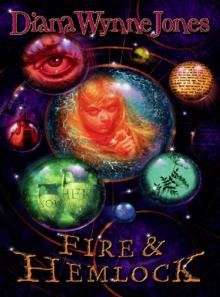 Fire and Hemlock
Fire and Hemlock Reflections: On the Magic of Writing
Reflections: On the Magic of Writing The Game
The Game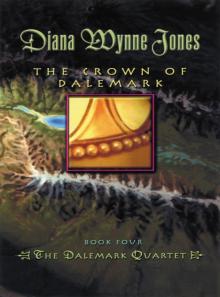 The Crown of Dalemark
The Crown of Dalemark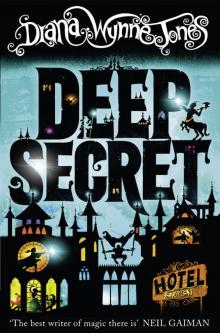 Deep Secret
Deep Secret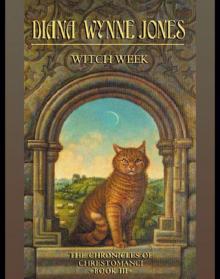 Witch Week
Witch Week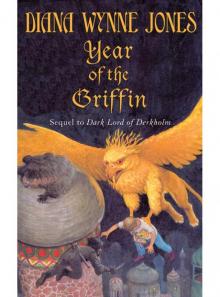 Year of the Griffin
Year of the Griffin Wild Robert
Wild Robert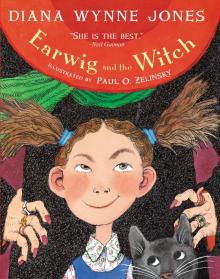 Earwig and the Witch
Earwig and the Witch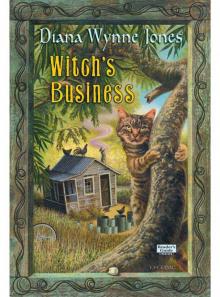 Witch's Business
Witch's Business Dogsbody
Dogsbody Caribbean Cruising
Caribbean Cruising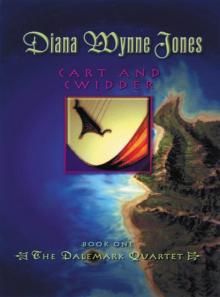 Cart and Cwidder
Cart and Cwidder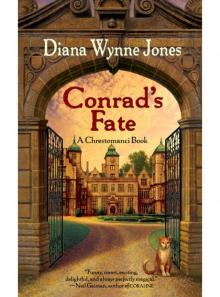 Conrad's Fate
Conrad's Fate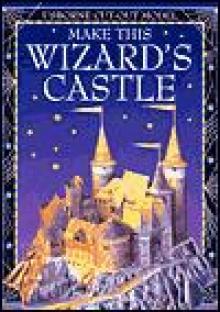 Howl's Moving Castle
Howl's Moving Castle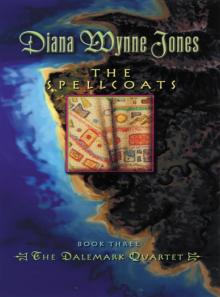 The Spellcoats
The Spellcoats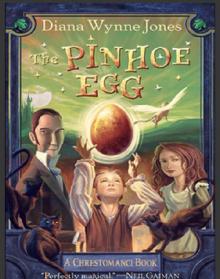 The Pinhoe Egg
The Pinhoe Egg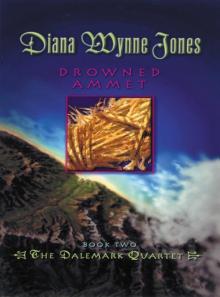 Drowned Ammet
Drowned Ammet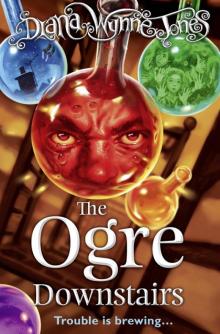 The Ogre Downstairs
The Ogre Downstairs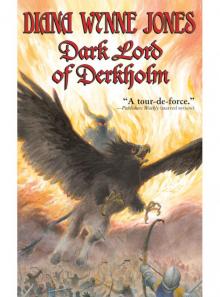 Dark Lord of Derkholm
Dark Lord of Derkholm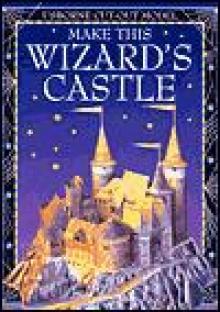 Castle in the Air
Castle in the Air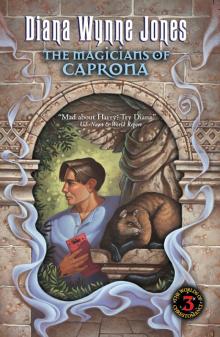 The Magicians of Caprona
The Magicians of Caprona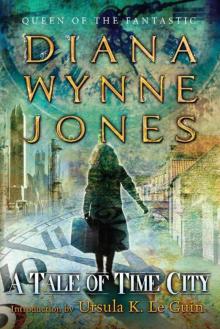 A Tale of Time City
A Tale of Time City The Lives of Christopher Chant
The Lives of Christopher Chant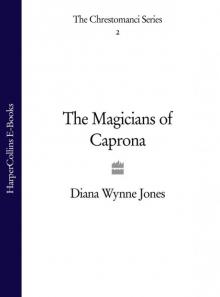 The Magicians of Caprona (UK)
The Magicians of Caprona (UK)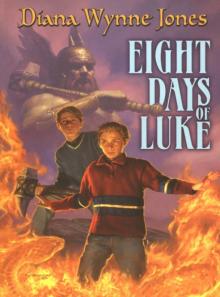 Eight Days of Luke
Eight Days of Luke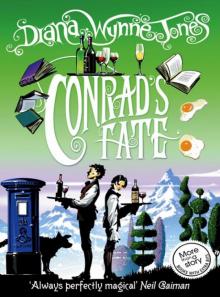 Conrad's Fate (UK)
Conrad's Fate (UK) A Sudden Wild Magic
A Sudden Wild Magic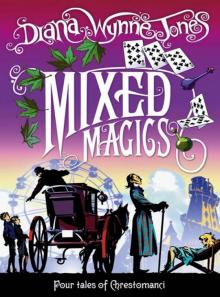 Mixed Magics (UK)
Mixed Magics (UK)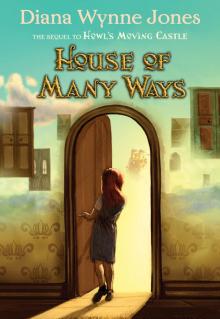 House of Many Ways
House of Many Ways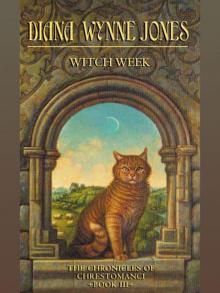 Witch Week (UK)
Witch Week (UK)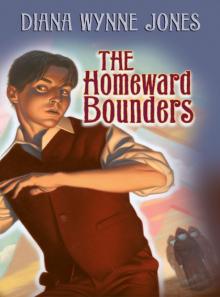 The Homeward Bounders
The Homeward Bounders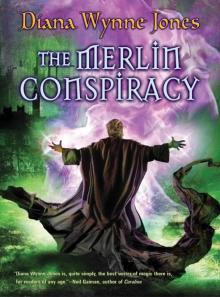 The Merlin Conspiracy
The Merlin Conspiracy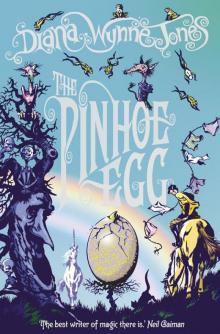 The Pinhoe Egg (UK)
The Pinhoe Egg (UK)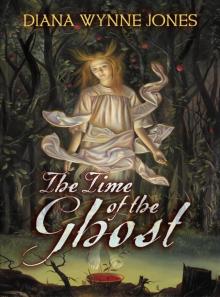 The Time of the Ghost
The Time of the Ghost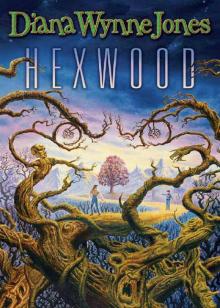 Hexwood
Hexwood Enchanted Glass
Enchanted Glass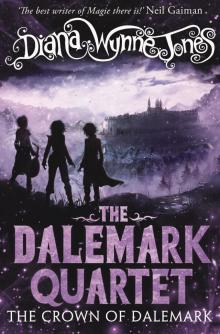 The Crown of Dalemark (UK)
The Crown of Dalemark (UK)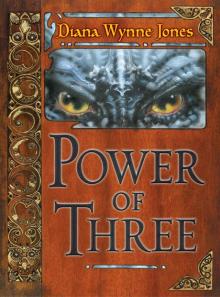 Power of Three
Power of Three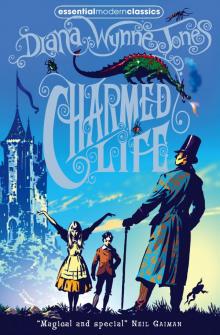 Charmed Life (UK)
Charmed Life (UK)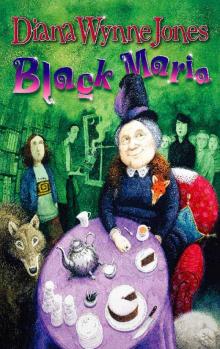 Black Maria
Black Maria The Islands of Chaldea
The Islands of Chaldea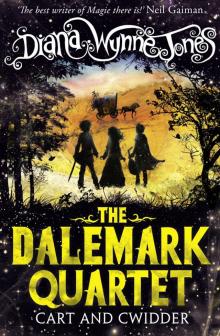 Cart and Cwidder (UK)
Cart and Cwidder (UK)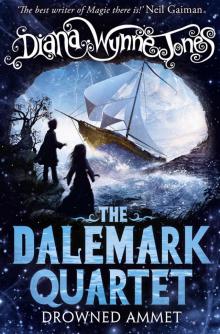 Drowned Ammet (UK)
Drowned Ammet (UK) Charmed Life
Charmed Life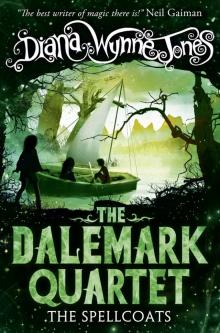 The Spellcoats (UK)
The Spellcoats (UK)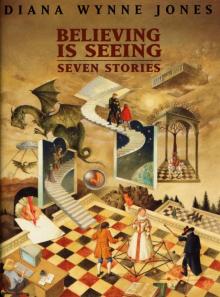 Believing Is Seeing
Believing Is Seeing Samantha's Diary
Samantha's Diary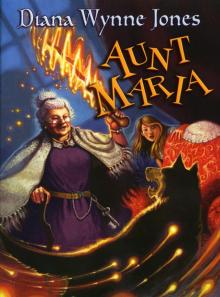 Aunt Maria
Aunt Maria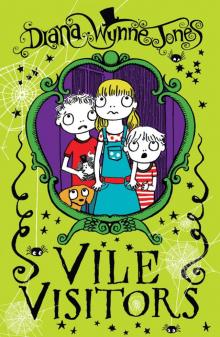 Vile Visitors
Vile Visitors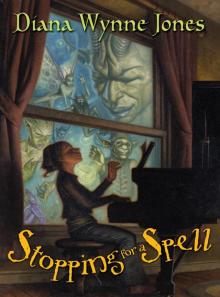 Stopping for a Spell
Stopping for a Spell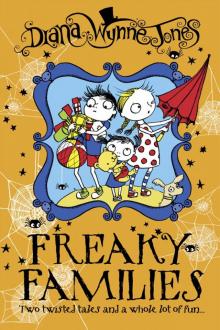 Freaky Families
Freaky Families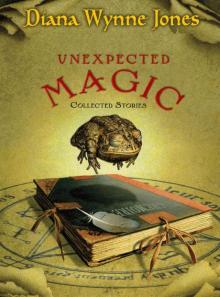 Unexpected Magic
Unexpected Magic Reflections
Reflections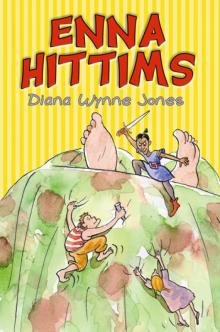 Enna Hittms
Enna Hittms Mixed Magics: Four Tales of Chrestomanci
Mixed Magics: Four Tales of Chrestomanci